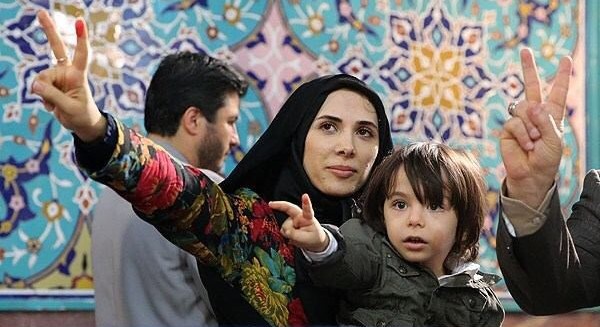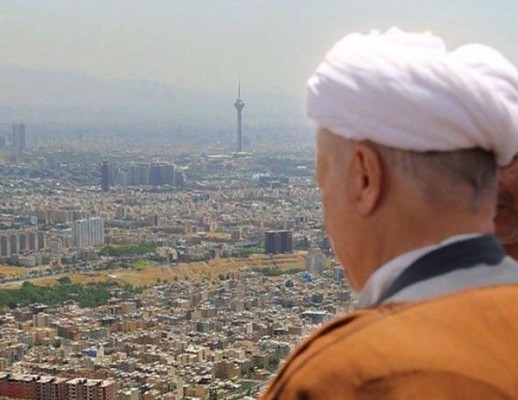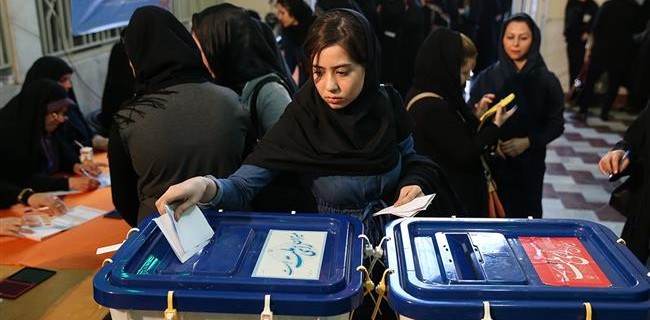PHOTO: Woman casts her ballot in Tehran, February 26, 2016
UPDATE 2200 GMT: With one ballot box to be countered, the centrist-moderate list has won 15 of the 16 seats in Tehran for the Assembly of Experts.
Both the current chair of the Assembly, Ayatollah Mohammad Yazdi, and the head of the hardline Endurance Front, Ayatollah Mesbah Yazdi, have lost their seats. Guardian Council leader Ayatollah Jannati has barely survived.
UPDATE 1830 GMT: The Supreme Leader has issued a message about the elections, “Thanks to the informed & determined nation of Iran who showed religious democracy, in its bright face, to the world.”
Addressing the elected Majlis: #Iran’s progress is main objective. Feigned progress without national dignity & independence is not accepted.
— Khamenei.ir (@khamenei_ir) February 28, 2016
President Rouhani has declared that “another golden page has been opened in the history of religious democracy” with the high turnout and presence of people in elections”.
The turnout was about 60%, slightly lower than the official figure from the last Parliamentary elections in 2012.
The Revolutionary Guards congratulated the nation for electing a Parliament with “revolutionary, anti-arrogance MPs loyal to velayat-e-faqih [the guardianship of the Supreme Leader]”.
UPDATE 1430 GMT: In a video interview, newly-elected MP Parvaneh Salahshuri explains what it means to be reformist:
We want change. We want to remove all the corrections of the past 10 years. We want to empower our women. We want to empower our youth.
We want to grow our economy, and we want sustainable development.
Another new MP, 30-year-old engineer Fatemeh Hosseini, with her son:

UPDATE 1110 GMT: The Twitter account of former President Hashemi Rafsanjani has called on all factions to accept the gains of the centrist-reformist coalition:
Nobody can resist against the will of the majority of the people. Anyone whom people don’t want should leave.
UPDATE 1030 GMT: The current head of the Assembly of Experts, Ayatollah Mohammad Yazdi, is in danger of not being returned to the body.
Yazdi has slipped out of the top 16 in the Tehran vote. Ayatollah Ali Jannati, the head of the Guardian Council, has dropped to 15th.
The head of the hardline Endurance Front, Ayatollah Mesbah Yazdi, will also lose his seat unless he recovers in the remaining ballots to be counted.
UPDATE 1000 GMT: According to a summary in Mehr, conservatives have won about half of more than 200 seats decided outside Tehran, with the rest split between the centrist-reformist bloc and independents.
Mehr’s tally has 99 seats guaranteed for conservatives, 55 for the centrist-reformist alliance, and 53 for independents.
If the centrist-reformist bloc maintain their hold on all 30 seats in Tehran, then they will be close to the conservative total. The balance of power will rest on independents and the outcome of run-off votes in early April for 53 seats.
Fars, the outlet of the Revolutionary Guards, has somewhat different figures but with the same implications for a split Majlis: Conservatives 107, Centrist-Reformist 89, and Independent 27.
UPDATE 0725 GMT: As centrists and reformists are poised for unexpected gains in elections, the office of Hashemi Rafsanjani has posted this Instagram photo of the former President:

UPDATE 0655 GMT: With 66% of the vote counted in Tehran, the head of the conservative bloc, Gholam Ali Haddad Adel — former Speaker of Parliament and member of the Supreme Leader’s inner circle — has fallen from 7th to 31st place.
Haddad Adel’s sudden decline means that the centrist-reformist List of Hope holds all 30 seats from Tehran in the 290-member Parliament.
ORIGINAL ENTRY: Defying restrictions seeking to prevent their success, centrists and reformists are on course for significant gains in Iran’s Parliamentary elections.
The centrists are linked to President Rouhani and former President Hashemi Rafsanjani, while reformists have been suppressed by detentions, limits on their communications, and intimidation. for more than a decade. They faced the disqualification of thousands of candidates by the Guardian Council, the body appointed by the Supreme Leader and the judiciary, in Friday’s ballot.
However, initial returns from Tehran pointed to a landslide for the centrist-reformist List of Hope. With 44% of the ballots counted, centrists and reformists held 29 of the 30 positions for MPs.
The vote was topped by Mohammad Reza Aref, the reformist candidate for President in 2013, followed by the maverick “conservative” MP Ali Motahari. Reformist MPs are in the next three positions, with Kazem Jalali, an ally of Speaker of Parlaiment Ali Larijani, in the 6th spot.
The only person outside the centrist-reformist list who would sit in Parliament for Tehran is the head of the leading conservative bloc in the elections, Gholam Ali Haddad Adel, a former Speaker and member of the Supreme Leader’s inner circle.
Conservatives, also known as principlists, are still projected to be the leading group in the 290-seat Parliament because of results outside the capital. Earlier on Saturday, Fars News reported that principlists had won 94 seats, with the centrist-reformist bloc taking 50 and independents gaining 15.
However, the outcome would bring some balance to the Majlis for the first time since the reformist Mohammad Khatami left the Presidency in 2005. It would be seen as a response to the disputed 2009 Presidential election, in which Mahmoud Ahmadinejad “won” amid mass protests that were subsequently put down with Green Movement leaders imprisoned for years. And the centrist-reformist presence will bolster President Rouhani, who is in protracted in-fighting with other elements of the regime over attempts to open Iran’s political and social space.
If confirmed, the Tehran result could also ensure that Speaker of Parliament Larijani withstands any attempt to remove him. Larijani had refused to stand with the principlist bloc in the elections, and Haddad Adel had been seen as a likely challenger for his position.
Centrists and Reformist Have Some Success in Assembly Elections
The centrists and reformists also hit back at the Guardian Council’s attempt to ensure conservative dominance of the Assembly of Experts, the body which chooses the Supreme Leader.
Rouhani and Rafsanjani, who is hoping to regain the chair of the Assembly, held the top two positions among the 28 clerics seeking Tehran’s 16 seats.
Even more significantly, 14 of the centrist-reformist list were in the top 16, with more than a third of votes counted.
The current head of the Assembly, Ayatollah Mohammad Yazdi, and the head of the Guardian Council, Ayatollah Jannati, were in danger of losing their seats. Ayatollah Mesbah Yazdi, the head of the hardline Endurance Front, was outside the top 16.
The Guardian Council disqualified 80% of the 801 candidates for the 88-seat Assembly, ensuring that in some of Iran’s 31 provinces, conservative clerics ran unopposed.

